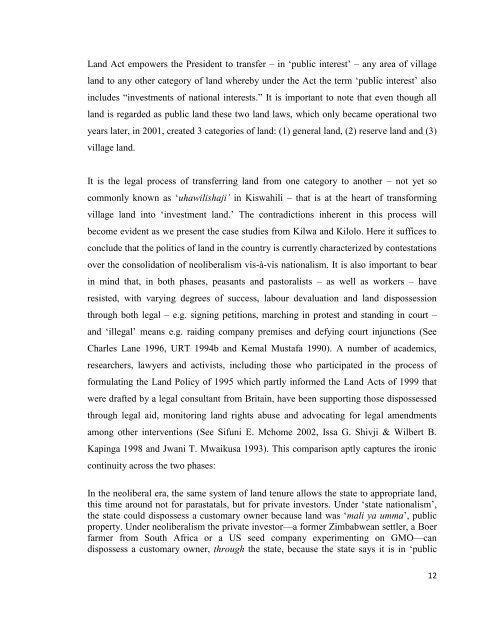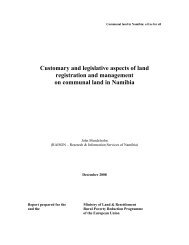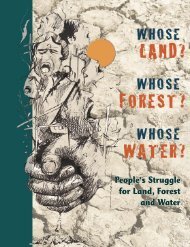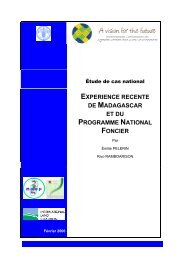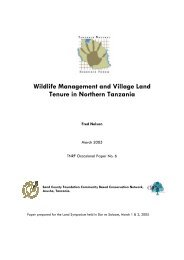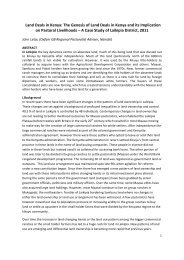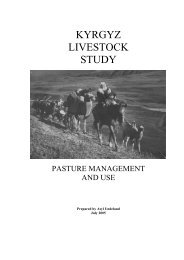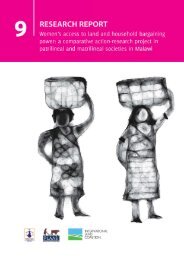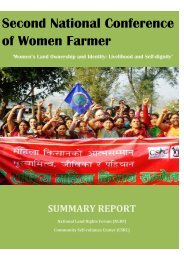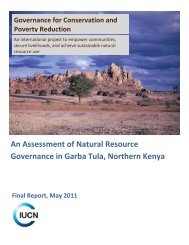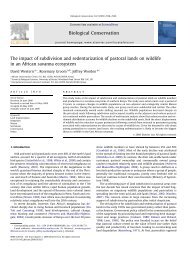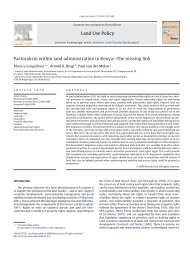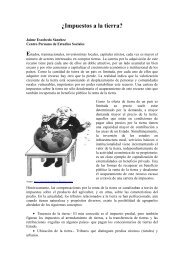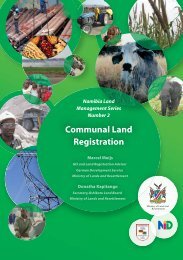accumulation by land dispossession and labor ... - Land Portal
accumulation by land dispossession and labor ... - Land Portal
accumulation by land dispossession and labor ... - Land Portal
You also want an ePaper? Increase the reach of your titles
YUMPU automatically turns print PDFs into web optimized ePapers that Google loves.
L<strong>and</strong> Act empowers the President to transfer – in ‗public interest‘ – any area of village<br />
<strong>l<strong>and</strong></strong> to any other category of <strong>l<strong>and</strong></strong> where<strong>by</strong> under the Act the term ‗public interest‘ also<br />
includes ―investments of national interests.‖ It is important to note that even though all<br />
<strong>l<strong>and</strong></strong> is regarded as public <strong>l<strong>and</strong></strong> these two <strong>l<strong>and</strong></strong> laws, which only became operational two<br />
years later, in 2001, created 3 categories of <strong>l<strong>and</strong></strong>: (1) general <strong>l<strong>and</strong></strong>, (2) reserve <strong>l<strong>and</strong></strong> <strong>and</strong> (3)<br />
village <strong>l<strong>and</strong></strong>.<br />
It is the legal process of transferring <strong>l<strong>and</strong></strong> from one category to another – not yet so<br />
commonly known as ‗uhawilishaji’ in Kiswahili – that is at the heart of transforming<br />
village <strong>l<strong>and</strong></strong> into ‗investment <strong>l<strong>and</strong></strong>.‘ The contradictions inherent in this process will<br />
become evident as we present the case studies from Kilwa <strong>and</strong> Kilolo. Here it suffices to<br />
conclude that the politics of <strong>l<strong>and</strong></strong> in the country is currently characterized <strong>by</strong> contestations<br />
over the consolidation of neoliberalism vis-à-vis nationalism. It is also important to bear<br />
in mind that, in both phases, peasants <strong>and</strong> pastoralists – as well as workers – have<br />
resisted, with varying degrees of success, labour devaluation <strong>and</strong> <strong>l<strong>and</strong></strong> <strong>dispossession</strong><br />
through both legal – e.g. signing petitions, marching in protest <strong>and</strong> st<strong>and</strong>ing in court –<br />
<strong>and</strong> ‗illegal‘ means e.g. raiding company premises <strong>and</strong> defying court injunctions (See<br />
Charles Lane 1996, URT 1994b <strong>and</strong> Kemal Mustafa 1990). A number of academics,<br />
researchers, lawyers <strong>and</strong> activists, including those who participated in the process of<br />
formulating the L<strong>and</strong> Policy of 1995 which partly informed the L<strong>and</strong> Acts of 1999 that<br />
were drafted <strong>by</strong> a legal consultant from Britain, have been supporting those dispossessed<br />
through legal aid, monitoring <strong>l<strong>and</strong></strong> rights abuse <strong>and</strong> advocating for legal amendments<br />
among other interventions (See Sifuni E. Mchome 2002, Issa G. Shivji & Wilbert B.<br />
Kapinga 1998 <strong>and</strong> Jwani T. Mwaikusa 1993). This comparison aptly captures the ironic<br />
continuity across the two phases:<br />
In the neoliberal era, the same system of <strong>l<strong>and</strong></strong> tenure allows the state to appropriate <strong>l<strong>and</strong></strong>,<br />
this time around not for parastatals, but for private investors. Under ‗state nationalism‘,<br />
the state could dispossess a customary owner because <strong>l<strong>and</strong></strong> was ‗mali ya umma‘, public<br />
property. Under neoliberalism the private investor—a former Zimbabwean settler, a Boer<br />
farmer from South Africa or a US seed company experimenting on GMO—can<br />
dispossess a customary owner, through the state, because the state says it is in ‗public<br />
12


